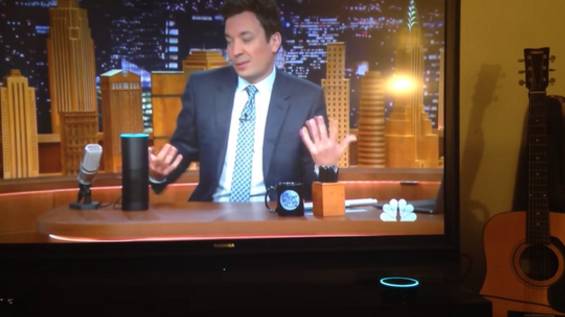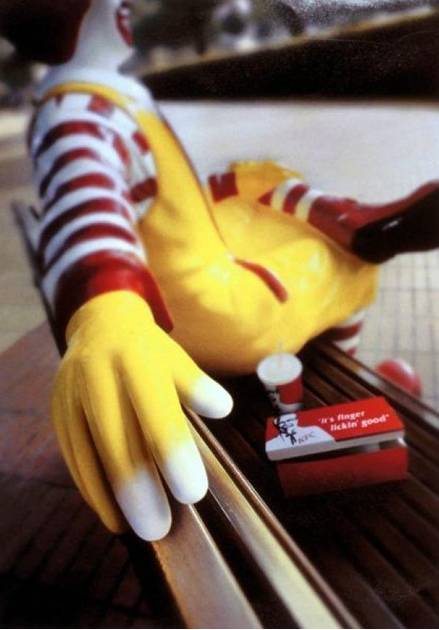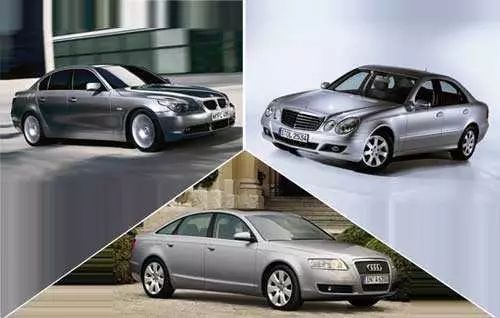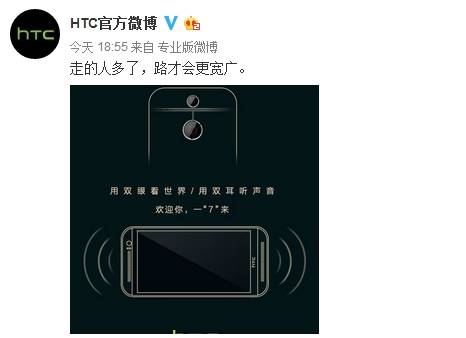Burger King "teased" Google was blocked, from competitive advertising to see the company "tearing each other" the right model
The following articles are from the most geeks , the author of the East also fell
The first new media to focus on cutting-edge technology and geek culture.
Author: The East is also falling
Source: Most Geek (ID: zuigeek)
In fact, it's not the first time Burger King has advertised this type of ad. Previously, Burger King on World Peace Day to talk to McDonald's "handshake and peace", triggered a number of fast food brands follow the trend and social networking hot discussion, even McDonald's love of the attitude has been taken by netizens to tease.

You can see the Google Home light on in the video screenshot
The trick from in-screen flirtation to off-screen has been played on the show by talk show host Jimmy Fallon, but it was Google Home's rival Amazon Echo that was teased.

The Amazon Echo on and off the screen lights up at the same time
Comparative advertising (competitive advertising) has always been loved by enterprises in various fields, it seems that in the emotional face of the fight for your life, but in essence can play a role in broadening the overall market.Abroad, officials are more tolerant of comparative advertising, for example, the Federal Trade Commission has said that comparative advertising encourages competition while providing consumers with more information and thus encourages companies to use comparative advertising. As a result of the entire business history, enterprises, especially large brands through the comparison of advertising "tearing each other" cases abound. From a few classic cases, you can feel the charm of comparative advertising.
Pepsi VS Coca-Cola: Only give me a footnote
Coca-Cola and Pepsico occupy almost the entire cola market, one is the market leader, the other is the market challenger, the two hundred-year-old enterprises have never been in a fight. Pepsi, as a challenger, has always liked to use a strategy of comparative advertising.
PepsiCo's main targeting is young people, whose advertising design in the main "young, lively, era" style at the same time, but also implied that Coca-Cola "outdated, outdated, old." Among the many Pepsi ads, the little boy's foot on Coca-Cola to buy Pepsi is the most derogatory, is typically provocative advertising.

At the beginning of the advertisement, the little boy buys two bottles of Coca-Cola from the vending machine, then places it on the ground, presses the higher Pepsi, and finally drinks Pepsi with satisfaction. Pepsi's cynicism about Coca-Cola is that "your brand can only give us a foot in the side".
KFC VS McDonald's: McDonald's also eats KFC
KFC and McDonald's two fast food giants to develop to this day, has jumped out of the low-level price war, and focus on the development of new products to expand the market, strategic differentiation is increasingly significant. However, at the beginning of its founding, its similar characteristics are doomed to each other's fate, no matter how the marketing means refurbished, but also inevitably because of the intersection of the fight.
In 2003, creative advertising agency BBDO designed a print poster for KFC singapore.

On behalf of McDonald's uncle sitting on the bench, next to the KFC, the box also printed with the words "It's Finger lickin' good (KFC is so delicious), KFC to show the overwhelming advantage of the competitors."
Apple VS Samsung: iPhone has become an old man's machine
The iPhone's standing in the lake doesn't have to be said, and Samsung has become a giant to rival Apple with Android. The front lines between the two giants have been stretched from technology and law to advertising.

At the time of the Galaxy S4's launch, Samsung released an ad that portrayed the iPhone 5 as an "old man's machine." In the ad, a high school student hosts a graduation party, and the youngster flashes the new features of the Galaxy S4, dwarfed by the iPhone used by his parents.
After the release of the iPhone 5, Samsung's list of features compared to the samsung Galaxy S3 and iPhone 5 in the left and right columns was much longer than Apple's. The ad, which features "Itdoesn't take a genius (no genius required, own it now), is below it the slogan Samsung has previously used, "The Next Big Things Is Already Here!" (The next great product is already here)."
Thus, in the business world, the use of comparative advertising has spread to all walks of life.Apple and Microsoft, Nike and Adi, Mercedes-Benz, BMW and Audi, U.S. car rental giants Hertz and Avs have all had similar competition, and even Durex is advertising "Happy Father's Day" to competitors.
Although the "tearing" between these big companies is not happy, it does not give the impression of hate, on the contrary, the public is happy to discuss the topics triggered by such advertisements.In fact, behind the emotional level of competition, comparative advertising is able to bring huge benefits to enterprises and have a beneficial impact, which is why enterprises are willing to spend millions of dollars a year on advertising in the "battle mouth" aspect of the important reason.
First, comparative advertising can help companies get sustained consumer attention.
For the giants, advertising has jumped out of the display function, showing advantages to convince consumers to buy the basic role, but mainly serve as a reminder and enhance the effect. On this basis, the form and content of advertising has a broader play space, so we see the big brands of advertising is often very creative or even empty.And competitors to each other or to a certain extent to attack each other is inno-free, this kind of fighting and the intensity of the attack both sides are unspeakable, for the benefits to each other also know.
In this level of comparative advertising, fun is the first point, but style is also very important.BMW, for example, has developed an advertising strategy since 2003 to "provocative" rivals, limiting it to high-end brand circles, and challengers respond with dignity, both with a sense of humor and dignity.

In more than ten years of you come to me, there are several high-end car brands by virtue of comparative advertising to broaden the entire automotive industry market, of which the "pick three" BMW, Audi, Mercedes-Benz is a long-term market share of China's high-end cars 80%, Jianghu jointly known as "ABB", can be seen how important the healthy competition between enterprises to the development of the entire market.
Second, comparative advertising can bring more benefits to the disadvantaged.
The concept of "weakness" here refers to the strength of the same magnitude of strength and weakness contrast. Burger King and McDonald's, for example, in the last 60 years of tangles, Burger King constantly "trickled" mcdonald's position in the burger industry, each "trickle-up" can enhance their own attention, trigger heated debate, and thus seek more benefits.
Another example is HTC's launch of a promotional document with the iPhone 7. Apple first equipped the iPhone 7 with dual cameras and stereo speakers, but HTC was one of the first manufacturers to have both technologies, with dual cameras in the HTC One M8 and boom Sound stereo speakers the logo of HTC phones.

HTC issued a humble note: "The more people go, the wider the road", intended to welcome everyone to improve the level of mobile phones. Although there is a potential, but because of the clever design of the case, successfully won attention and praise.
In addition, Samsung derided Apple as an arcade, a tactic that Anderma and Nike are using to compete for a spokesman. For the weak, attacking the strong is actually using the other side's momentum to enhance their own strength, conducive to the long-term development of the brand.
Third, in the age of universal entertainment, the tone of flirtation is more in tune with the ultimate product
In general, good marketing strategies are associated with entertainment and flirtation, for high-quality brand advertising, entertainment atmosphere is its best companion, or even standard. Big brands advertise basically do not take the product itself, but pay more attention to the scene setting, create a stronger entertainment atmosphere, so that consumers are infected by the warm atmosphere, to achieve the purpose of deepening the impression. Comparative advertising is easier to present in a humorous way, conducive to creating this atmosphere, so many large enterprises favor.
In fact, there are some restrictions on comparative advertising in various countries, especially in China.In China, comparative advertising is likened to a "cliff-edge dance", which illustrates its dangers. China's current Advertising Law was promulgated in 1994, has not been amended, many provisions are not clear, but article 12 expressly states: "Advertising is not allowed to demean the goods or services of other production operators." "
This means that the ad can neither mention the opponent's name nor suggest that consumers know that a brand is being compared. This puts comparative advertising in a narrow play space: you can't compare yourself to a competitor, and if your product is really better than your competitors, it's demeaning, in violation of section 12 of the Advertising Act. If your product is inferior to your competitor's, it would violate section 14 of the Unfair Competition Act, even if it is unfair competition. As a result, many brands now have to be compared to themselves in advertising.Still, the huge benefits of comparative advertising have made many companies willing to put themselves on the "cliff edge".

For example, last year nailed "provocative" WeChat. First nailed in the "Shenzhen Evening News" and "Shenzhen Morning Post" on the huge advertising insinual WeChat, followed by Ma Yun apologized but let JD.com innocent "lying gun", because JD.com in the "New Beijing News" for their own 618 carnival publicity by the insinuity of the double 11 is still a long time, but 618 is near.

Although several large enterprises are "cut constantly messy", but there is no lack of fun, while enhancing interaction with competitors and consumers, the starting point is good.But now some enterprises' comparative advertising is really a malicious denigration of competitors, instantly pulled down the tone, self-righteously hit the opponent, in fact, will only be looked down upon by the outside world. Not only is it not beneficial to their own progress, but also will affect the healthy development of the industry.
In fact, the comparative advertising itself is not good or bad, its nature depends entirely on the enterprise's mentality.Many big brands often use competitive advertising to "tear each other apart", but it is based on fair competition. Advertising is only a means of communication with each other, and even with some regret, and ultimately through competitive advertising to broaden the market, to achieve a win-win situation or even win-win. On the other hand, the kind of competitive advertising that raises oneself through malicious repression is to the detriment of others, and in the end only two defeats.
It can be seen that the correct mode of "communication" between enterprises using comparative advertising is not mutual vilification, but the use of "love and kill" to describe more accurate, healthy competition should be based on mutual appreciation and respect. Rather than tried to hurt the opponent, it is better to spend more effort to improve the quality of their products, after all, any publicity and marketing is only external auxiliary means, can bring benefits to the enterprise after all or quality products.
Author: The East is also falling
Source: Most Geek (ID: zuigeek)

Go to "Discovery" - "Take a look" browse "Friends are watching"